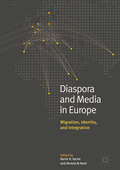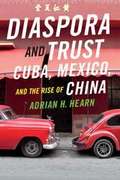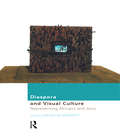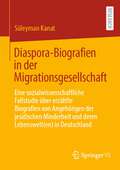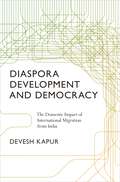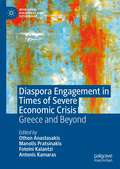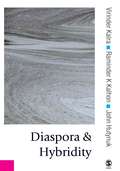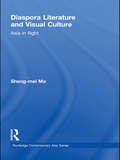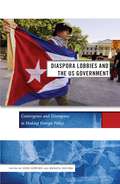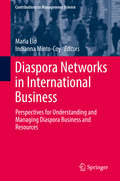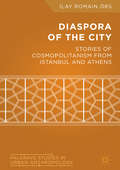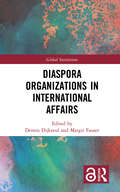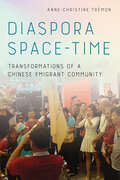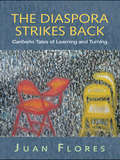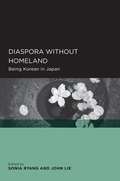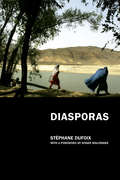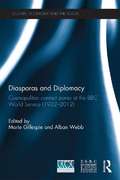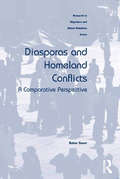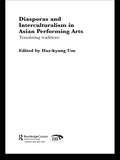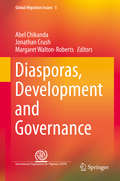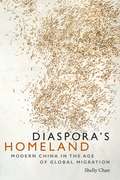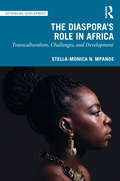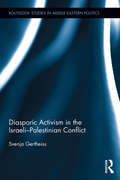- Table View
- List View
Diaspora and Media in Europe
by Karim H. Karim Ahmed Al-RawiThis book examines how African, Asian, Middle Eastern and Latin American diasporas use media to communicate among themselves and to integrate into European countries. Whereas migrant communities continue employing print and broadcasting technologies, the rapidly growing applications of Internet platforms like social media have substantially enriched their interactions. These communication practices provide valuable insights into how diasporas define themselves. The anthology investigates varied uses of media by Ecuadorian, Congolese, Moroccan, Nepalese, Portugal, Somali, Syrian and Turkish communities residing in Belgium, Germany, Italy, the Netherlands, Spain, Sweden and the UK. These studies are based on research methodologies including big data analysis, content analysis, focus groups, interviews, surveys and visual framing, and they make a strong contribution to the emerging theory of diasporic media.
Diaspora and Trust: Cuba, Mexico, and the Rise of China
by Adrian H. HearnIn Diaspora and Trust Adrian H. Hearn proposes that a new paradigm of socio-economic development is gaining importance for Cuba and Mexico. Despite their contrasting political ideologies, both countries must build new forms of trust among the state, society, and resident Chinese diaspora communities if they are to harness the potentials of China's rise. Combining political and economic analysis with ethnographic fieldwork, Hearn analyzes Cuba's and Mexico's historical relations with China, and highlights how Chinese diaspora communities are now deepening these ties. Theorizing trust as an alternative to existing models of exchange--which are failing to navigate the world's shifting economic currents--Hearn shows how Cuba and Mexico can reformulate the balance of power between state, market, and society. A new paradigm of domestic development and foreign engagement based on trust is becoming critical for Cuba, Mexico, and other countries seeking to benefit from China's growing economic power and social influence.
Diaspora and Visual Culture: Representing Africans and Jews
by Nicholas MirzoeffThis is the first book to examine the connections between diaspora - the movement, whether forced or voluntary, of a nation or group of people from one homeland to another - and its representations in visual culture. Two foundational articles by Stuart Hall and the painter R.B. Kitaj provide points of departure for an exploration of the meanings of diaspora for cultural identity and artistic practice. A distinguished group of contributors, who include Alan Sinfield, Irit Rogoff, and Eunice Lipton, address the rich complexity of diasporic cultures and art, but with a focus on the visual culture of the Jewish and African diasporas. Individual articles address the Jewish diaspora and visual culture from the 19th century to the present, and work by African American and Afro-Brazilian artists.
Diaspora-Biografien in der Migrationsgesellschaft: Eine sozialwissenschaftliche Fallstudie über erzählte Biografien von Angehörigen der jesidischen Minderheit und deren Lebenswelt(en) in Deutschland
by Süleyman KanatDie Minderheit der Jesiden, deren Angehörige mittlerweile zum Teil in der dritten Generation in der deutschen Migrationsgesellschaft leben, ist vor allem durch den an ihnen im Nordirak verübten Genozid im Jahr 2014 vorübergehend in das öffentliche Interesse gerückt. Zwar gibt es Forschungsarbeiten über die Lage dieser Minderheit im deutschsprachigen Raum, doch fehlen vor allem für die Soziale Arbeit notwendige biografieorientierte Fallstudien, die die Perspektive der Betroffenen tiefergehend qualitativ analysieren. Dieses Buch beschäftigt sich daher mit dem Fragenkomplex, welchen möglichen biografischen Herausforderungen Angehörige der jesidischen Minderheit unter den Bedingungen eines Lebens in der Diaspora einer Migrationsgesellschaft ausgesetzt seien können und wie diese von ihnen in ihren individuellen Lebenslagen und Lebenswelten artikuliert, eingeordnet und bewältigt werden. Neben der Sensibilisierung für die Lebenslagen der jesidischen Minderheit in der Diaspora ist es auch ein Forschungsbeitrag, die Komplexität migrationsgesellschaftlicher Verhältnisse aus der subjektiven Perspektive von Minderheitsangehörigen besser zu verstehen. Damit wird es auch möglich, die lebensweltlichen Voraussetzungen, unter denen die Betroffenen an institutionellen Bildungssettings teilhaben, zu berücksichtigen.
Diaspora by Design
by Saeed Rahnema Mark Goodman Haideh MoghissiFew groups face as many misconceptions within their new countries as do Muslim immigrants. This book challenges the common misperceptions of Muslim immigrants as a homogeneous, religiously driven group and identifies the tensions they experience within their host countries. A comparative, multi-ethnic study, based on over two thousand interviews, Diaspora by Design examines Muslim populations that have settled in Canada, Britain, Iran, and Palestine. Utilizing hard socio-economic data as well as qualitative analysis, the authors show the remarkable diversity and divisions between Muslim immigrant populations along urban-rural, cultural, class, and gender lines. They argue that integration is a two-way exchange that requires a readiness on the part of the host society to remove barriers that prevent the full social and economic participation of immigrant populations. Extensively researched and thoughtfully provocative, Diaspora by Design is a much-needed work that provides an accurate and dynamic depiction of the lives of Muslim immigrants away from their homelands.
Diaspora, Development, and Democracy: The Domestic Impact of International Migration from India
by Devesh KapurWhat happens to a country when its skilled workers emigrate? The first book to examine the complex economic, social, and political effects of emigration on India, Diaspora, Development, and Democracy provides a conceptual framework for understanding the repercussions of international migration on migrants' home countries. Devesh Kapur finds that migration has influenced India far beyond a simplistic "brain drain"--migration's impact greatly depends on who leaves and why. The book offers new methods and empirical evidence for measuring these traits and shows how data about these characteristics link to specific outcomes. For instance, the positive selection of Indian migrants through education has strengthened India's democracy by creating a political space for previously excluded social groups. Because older Indian elites have an exit option, they are less likely to resist the loss of political power at home. Education and training abroad has played an important role in facilitating the flow of expertise to India, integrating the country into the world economy, positively shaping how India is perceived, and changing traditional conceptions of citizenship. The book highlights a paradox--while international migration is a cause and consequence of globalization, its effects on countries of origin depend largely on factors internal to those countries. A rich portrait of the Indian migrant community, Diaspora, Development, and Democracy explores the complex political and economic consequences of migration for the countries migrants leave behind.
Diaspora Engagement in Times of Severe Economic Crisis: Greece and Beyond (Migration, Diasporas and Citizenship)
by Othon Anastasakis Manolis Pratsinakis Foteini Kalantzi Antonis KamarasHow does a severe economic crisis impact on diaspora-homeland relations? The present volume addresses this question by exploring diaspora engagement in Greece during the protracted post-2009 eurozone crisis. In so doing, it looks at the crisis as a critical juncture in Greece’s relations with its nationals abroad. The contributors in this book explore aspects of diaspora engagement, including transnational mobilisation, homeland reform, the role of diasporic institutions, crisis driven migration, as well as, comparisons with other countries in Europe. This book provides a compelling and original interdisciplinary study of contemporary diaspora issues, through the lens of an advanced economy and democracy facing a prolonged crisis, and, as such, it is a significant addition to the literature on European diasporas.
Diaspora & Hybridity (Published in association with Theory, Culture & Society)
by Virinder S. Kalra Raminder Kaur John Hutnyk'Diaspora & Hybridity deals with those theoretical issues which concern social theory and social change in the new millennium. The volume provides a refreshing, critical and illuminating analysis of concepts of diaspora and hybridity and their impact on multi-ethnic and multi-cultural societies' - Dr Rohit Barot, Department of Archaeology and Anthropology, University of Bristol What do we mean by 'diaspora' and 'hybridity'? Why are they pivotal concepts in contemporary debates on race, culture and society? This book is an exhaustive, politically inflected, assessment of the key debates on diaspora and hybridity. It relates the topics to contemporary social struggles and cultural contexts, providing the reader with a framework to evaluate and displace the key ideological arguments, theories and narratives deployed in culturalist academic circles today. The authors demonstrate how diaspora and hybridity serve as problematic tools, cutting across traditional boundaries of nations and groups, where trans-national spaces for a range of contested cultural, political and economic outcomes might arise. Wide ranging, richly illustrated and challenging, it will be of interest to students of cultural studies, sociology, ethnicity and nationalism.
Diaspora Literature and Visual Culture: Asia in Flight (Routledge Contemporary Asia Series)
by Sheng-mei MaThis book offers an incisive and ambitious critique of Asian Diaspora culture, looking specifically at literature and visual popular culture. Sheng-mei Ma’s engaging text discusses issues of self and its relationship with Asian Diaspora culture in the global twenty-first century. Using examples from Asia, Asian America, and Asian Diaspora from the West, the book weaves a narrative that challenges the twenty-first century triumphal discourse of Asia and argues that given the long shadow cast across modern film and literature, this upward mobility is inescapably escapist, a flight from itself; Asia’s stunning self-transformation is haunted by self-alienation. The chapters discuss a wealth of topics, including Asianness, Orientalism, and Asian American identity, drawing on a variety of pop culture sources from The Matrix Trilogy to Crouching Tiger, Hidden Dragon. This book forms an analysis of the new idea of Asian Diaspora that cuts across area, ethnicity, and nation, incorporating itself into the contemporary global culture whilst retaining a distinct Asian flavor. Covering the mediums of literature, film, and visual cultures, this book will be of immense interest to scholars and students of Asian studies and literature, ethnic studies, cultural studies, and film.
Diaspora Lobbies and the US Government: Convergence and Divergence in Making Foreign Policy (Social Science Research Council #2)
by Edited by Josh DeWind and Renata SeguraAs a nation ofimmigrants, the United States has long accepted that citizens who identify withan ancestral homeland may hold dual loyalties; yet Americans have at timesregarded the persistence of foreign ties with suspicion, seeing them as a sign ofpotential disloyalty and a threat to national security. Diaspora Lobbies and the US Government bringstogether a group of distinguished scholars of international politics andinternational migration to examine this contradiction in the realm of Americanpolicy making, ultimately concluding that the relationship between diasporagroups and the government can greatly affect foreign policy. This relationshipis not unidirectional—as much as immigrants make an effort to shape foreignpolicy, government legislators and administrators also seek to enlist them infurthering American interests.From Israel to Cuba and from Ireland to Iraq, the casestudies in this volume illustrate how potential or ongoing conflicts raise thestakes for successful policy outcomes. Contributors provide historical andsociological context, gauging the influence of diasporas based on populationsize and length of time settled in the United States, geographic concentration,access to resources from their own members or through other groups, and thenature of their involvement back in their homelands. This collection brings a freshperspective to a rarely discussed aspect of the design of US foreign policy andoffers multiple insights into dynamics that may determine how the United Stateswill engage other nations in future decades.
Diaspora Nationalism and Jewish Identity in Habsburg Galicia
by Joshua ShanesThe triumph of Zionism has clouded recollection of competing forms of Jewish nationalism vying for power a century ago. This study explores alternative ways to construct the modern Jewish nation. Jewish nationalism emerges from this book as a Diaspora phenomenon much broader than the Zionist movement. Like its non-Jewish counterparts, Jewish nationalism was first and foremost a movement to nationalize Jews, to construct a modern Jewish nation while simultaneously masking its very modernity. This book traces this process in what was the second largest Jewish community in Europe, Galicia. The history of this vital but very much understudied community of Jews fills a critical lacuna in existing scholarship while revisiting the broader question of how Jewish nationalism - or indeed any modern nationalism - was born. Based on a wide variety of sources, many newly uncovered, this study challenges the still-dominant Zionist narrative by demonstrating that Jewish nationalism was a part of the rising nationalist movements in Europe.
Diaspora Networks in International Business: Perspectives For Understanding And Managing Diaspora Business And Resources (Contributions to Management Science)
by Maria Elo Indianna Minto-CoyThis contributed volume focuses on diasporans, their characteristics, networks, resources and activities in relation to international business and entrepreneurship. It presents an overview of diaspora concepts from an economic perspective, and analyzes the global-economic and societal effects and mechanisms, revealing both positive and negative aspects of diaspora activities. Providing insights into the socio-cultural influences, it discusses diaspora entrepreneurship and international business, the respective organisational models, investments and business types. Lastly it offers an assessment of managing diaspora resources and policymaking. This book was created by an interdisciplinary team of editors, co-authors and reviewers including historians, sociologists, psychologists, linguists and ethnologists, as well as experts in public policy, international business, marketing and entrepreneurship. This unique team (many of the authors are themselves diasporans with an extensive understanding of their topic) provides the first global academic platform on the subject, combining the latest empirical evidence from developing, emerging, transitional and developed countries with various combinations of diaspora flows that to date have received little attention.
Diaspora of the City: Stories of Cosmopolitanism from Istanbul and Athens (Palgrave Studies in Urban Anthropology)
by İlay Romain ÖrsAs the former capital of two great empires—Eastern Roman and Ottoman—Istanbul has been home to many diverse populations, a condition often glossed as cosmopolitanism. The Greek-speaking Christian Orthodox community (Rum Polites) is among the oldest in the urban society, yet their leading status during the centuries of imperial cosmopolitanism has faded. They have even been brought to the brink of disappearance in their home city. Scattered around the world as a result of the homogenizing tendencies of nationalism, the Rum Polites in the diaspora of Istanbul (“the City” or Poli) continue to identify with its cosmopolitan legacy, as vividly shown through their everyday practices of distinction and cultural memory. By exploring the shifting meaning of cosmopolitanism in spatial and temporal contexts, Diaspora of the City examines how experiences of forced displacement can highlight changing conceptualizations of what constitutes a local, diasporic, minority, or migrant community in different multicultural urban settings, past and present.
Diaspora Organizations in International Affairs (Global Institutions)
by Dennis Dijkzeul Margit FauserAnalyzing the role and impact of Diaspora Organizations (DOs) in International Relations (IR), this interdisciplinary volume provides empirical accounts of their work across Europe, the Americas, Africa and the Middle East. Over the last three decades, DOs have increased in number, spread to new regions, and addressed an ever-widening array of global problems, yet they have not received sufficient attention in IR in spite of the inter- and transnational nature of their involvements. Contributions explore important topics such as: The role of DOs in cooperation and conflict and in change and stability; DOs as transnational organizations and their degree of autonomy and power within the networks in which they operate; and The changing roles of DOs vis-à-vis states, regimes, and international organizations, when dealing with issues as diverse as peace, conflict, migration, integration, development, humanitarian action, human rights, religion, and economic growth. Demonstrating how IR can benefit from a stronger focus on DOs, this book will also help other disciplines gain insights into DOs and will prove useful to those in the fields of international relations, sociology, geography and anthropology.
Diaspora Space-Time: Transformations of a Chinese Emigrant Community
by Anne-Christine TrémonDiaspora Space-Time explores the transformations of Pine Mansion—a Shenzhen former emigrant community—and its members' changing relationship with their diaspora around the world. For more than a century, inhabitants of Shenzhen's villages have migrated to Southeast Asia, the Pacific, North and South America, and Europe. With China's economic global ascendancy, these villages no longer consist of peasants dependent on their rich overseas relatives. As the villages have become part of the special economic zone of Shenzhen, the megacity that embodies China's rise, emigration has waned.Lineage ties have long been central in choosing migration destinations and channeling donations to village projects. After China's reopening, Shenzhen's villagers used diaspora as a resource to participate in the city's booming economy and to reestablish and protect their ritual sites against government plans. As overseas financial contributions diminish and diasporic relations change, Anne-Christine Trémon highlights the way emigration is being reconceptualized in regards to China's changing position in the world, offering a new perspective on Chinese globalization and the politics of scale-making.
The Diaspora Strikes Back: Caribeño Tales of Learning and Turning (Cultural Spaces)
by Juan FloresIn The Diaspora Strikes Back the eminent ethnic and cultural studies scholar Juan Flores flips the process on its head: what happens to the home country when it is being constantly fed by emigrants returning from abroad? He looks at how 'Nuyoricans' (Puerto Rican New Yorkers) have transformed the home country, introducing hip hop and modern New York culture to the Caribbean island. While he focuses on New York and Mayaguez (in Puerto Rico), the model is broadly applicable. Indians introducing contemporary British culture to India; New York Dominicans bringing slices of New York culture back to the Dominican Republic; Mexicans bringing LA culture (from fast food to heavy metal) back to Guadalajara and Monterrey. This ongoing process is both massive and global, and Flores' novel account will command a significant audience across disciplines.
Diaspora without Homeland: Being Korean in Japan
by Sonia Ryang John LieMore than one-half million people of Korean descent reside in Japan today--the largest ethnic minority in a country often assumed to be homogeneous. This timely, interdisciplinary volume blends original empirical research with the vibrant field of diaspora studies to understand the complicated history, identity, and status of the Korean minority in Japan. An international group of scholars explores commonalities and contradictions in the Korean diasporic experience, touching on such issues as citizenship and belonging, the personal and the political, and homeland and hostland.
Diasporas
by Stephane Dufoix Roger Waldinger William RodamorCoined in the third century B.C., the term diaspora has evolved into a buzzword used to describe the migrations of groups as diverse as ethnic populations, religious communities, and even engineers working abroad. This concise book provides a critical introduction to the concept of diaspora, bringing a fresh, synthetic perspective to virtually all aspects of this topic. Stéphane Dufoix incorporates a wealth of case studies--about the Jewish, Armenian, African, Chinese, Greek, and Indian experiences-- to illustrate key concepts, give a clear overview on current thinking, and reassess the value of the term for us today.
Diasporas and Diplomacy: Cosmopolitan contact zones at the BBC World Service (1932–2012) (CRESC)
by Marie Gillespie Alban WebbDiasporas and Diplomacy analyzes the exercise of British ‘soft power’ through the BBC’s foreign language services, and the diplomatic role played by their diasporic broadcasters. The book offers the first historical and comparative analysis of the ‘corporate cosmopolitanism’ that has characterized the work of the BBC’s international services since the inception of its Empire Service in 1932 – from radio to the Internet. A series of empirically-grounded case studies, within a shared analytical framework, interrogate transformations in international broadcasting relating to: colonialism and corporate cosmopolitanism diasporic and national identities public diplomacy and international relations broadcasters and audiences The book will be of interest to students and scholars of sociology and anthropology, media and cultural studies, journalism, history, politics, international relations, as well as of research methods that cross the boundaries between the Social Sciences and Humanities. It will also appeal to broadcast journalists and practioners of strategic communication.
Diasporas and Homeland Conflicts: A Comparative Perspective (Research in Migration and Ethnic Relations Series)
by Bahar BaserAs violent conflicts become increasingly intra-state rather than inter-state, international migration has rendered them increasingly transnational, as protagonists from each side find themselves in new countries of residence. In spite of leaving their homeland, the grievances and grudges that existed between them are not forgotten and can be passed to the next generation. This book explores the extension of homeland conflicts into transnational space amongst diaspora groups, with particular attention to the interactions between second-generation migrants. Comparative in approach, Diasporas and Homeland Conflicts focuses on the tensions that exist between Kurdish and Turkish populations in Sweden and Germany, examining the effects of hostland policies and politics on the construction, shaping or elimination of homeland conflicts. Drawing on extensive interview material with members of diasporic communities, this book sheds fresh light on the influences exercised on conflict dynamics by state policies on migrant incorporation and multiculturalism, as well as structures of migrant organizations. As such, it will be of interest to scholars of sociology, political science and international studies with interests in migration and diaspora, integration and transnational conflict.
Diasporas and Interculturalism in Asian Performing Arts: Translating Traditions (Curzon - International Institute For Asian Studies #Vol. 11)
by Hae-Kyung UmIn an age of globalization, performance is increasingly drawn from intercultural creativity and located in multicultural settings. This volume is the first to focus on the performing arts of Asian diasporas in the context of modernity and multiculturalism. The essays locate the contemporary performing arts as a discursive field in which the boundaries between tradition and translation, and authenticity and hybridity are redefined and negotiated to create a multitude of meaning and aesthetics in global and local contexts.With contributions from scholars of Asian studies, theatre studies, anthropology, cultural studies, dance ethnology and musicology, this truly interdisciplinary work covers every aspect of the sociology of performance of the Asian diasporas.
Diasporas, Development and Governance
by Abel Chikanda Jonathan Crush Margaret Walton-RobertsDrawing on examples from the global North and South, this book examines the relationship between migration, development and diaspora engagement from a governance perspective. It explores the ways that governments interact with their own extra-national diasporic populations in order to boost economic development, build global trading and investment networks, and increase their political leverage overseas. Inside, readers will find fifteen essays which highlight such issues as diaspora engagement by governments at different scales, the divisions that often exist within diaspora groups, diaspora transnationalism and return migration, diaspora knowledge networks and higher education capacity building, and the neglected issues of South-South migration and diasporas as well as North-South migration and diasporas. The book presents empirical case studies from various geographical contexts including Australia, Canada, the Philippines, India, the Caribbean, Zimbabwe, and the United States. Overall, this book presents fresh insights into how and why migrant-sending countries are increasingly turning to the diaspora option to attempt to benefit from the transfer of knowledge, skills and financial and social capital. It provides policy makers, researchers, and students with new perspectives on governance and the means by which states are attempting to utilize their diaspora resources.
Diaspora’s Homeland: Modern China In The Age Of Global Migration
by Shelly ChanIn Diaspora’s Homeland Shelly Chan provides a broad historical study of how the mass migration of more than twenty million Chinese overseas influenced China’s politics, economics, and culture. Chan develops the concept of “diaspora moments”—a series of recurring disjunctions in which migrant temporalities come into tension with local, national, and global ones—to map the multiple historical geographies in which the Chinese homeland and diaspora emerge. Chan describes several distinct moments, including the lifting of the Qing emigration ban in 1893, intellectual debates in the 1920s and 1930s about whether Chinese emigration constituted colonization and whether Confucianism should be the basis for a modern Chinese identity, as well as the intersection of gender, returns, and Communist campaigns in the 1950s and 1960s. Adopting a transnational frame, Chan narrates Chinese history through a reconceptualization of diaspora to show how mass migration helped establish China as a nation-state within a global system.
The Diaspora's Role in Africa: Transculturalism, Challenges, and Development (Rethinking Development)
by Stella-Monica N. MpandeAfricans living in the diaspora have a unique position as potential agents of change in helping to address Africa’s political and socioeconomic challenges. In addition to sending financial remittances, their multiple, hybrid identities in and out of geographical and psychocultural spaces allow them to play a role as cultural and political ambassadors to foster social change and sustainable development back in their African homelands. However, this hybrid position is not without challenges, and this book reflects some of the conundrums faced by members of the diaspora as they negotiate their relationships with their home countries. The author uses her lived experiences and empirical research to ask: are members of the diaspora conduits of Western cultural hegemony at the cost of their traditional preservation and meaningful development in Africa? How does the Western media’s portrayal of Africa as the "Dark Continent" in the 21st century influence their decision-making process to invest back home? How could African nations’ governments manage their relationships with citizens abroad to motivate them to invest in their home countries? How do some citizen-residents in Africa and African Diaspora communities perceive each other in the context of Africa’s development? How could the African Diaspora collaborate with citizen-residents across growth sectors to impact Africa’s development? The book hopes to inspire agents of change within the diaspora and features diverse African entrepreneurs’ success stories and their experiences of tackling these challenges. The book will be of interest to aspiring entrepreneurs, researchers across African studies, and the expanding and vibrant field of diaspora research.
Diasporic Activism in the Israeli-Palestinian Conflict (Routledge Studies in Middle Eastern Politics)
by Svenja GertheissWith their homelands at war, can Diasporas lead the way to peace, or do they present an obstacle to conflict resolution, nurturing hate far away from those who actually fall victim to violence? And which of these roles do the Jewish and Palestinian diaspora communities play in the Israeli-Palestinian conflict? Particularly since the Oslo peace process, the search for a solution to the Israeli-Palestinian conflict has been strongly contested among Jewish and Arab/Palestinian Organizations in the United States. Through an analysis of the activities of Arab-Palestinian and Jewish organizations on behalf of and towards their conflict-ridden homelands, Diasporic Activism in the Israeli-Palestinian Conflict provides both a detailed picture of diasporic activism in the Middle East as well as advancing theory-building on the roles of diasporas in helping or hindering peace. Drawing on research into (transnational) social movements, diaspora studies and constructivist International Relations theory, this book retraces how this process of diversification occurred, and explains why neither the Jewish nor the Arab Diaspora community hold a unified position in the Israeli-Palestinian conflict, but are each comprised of both hawks and doves. Combining theoretical depth and practical orientation, this book is a key resource for those working in the fields of Middle Eastern studies, Peace and Conflict Studies and Diapora Studies, as well as specialists on the ground in Israel/Palestine and other conflict settings in which Diaspora communities play a prominent role.
